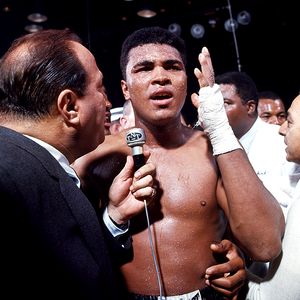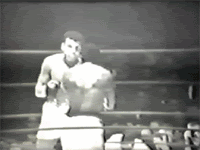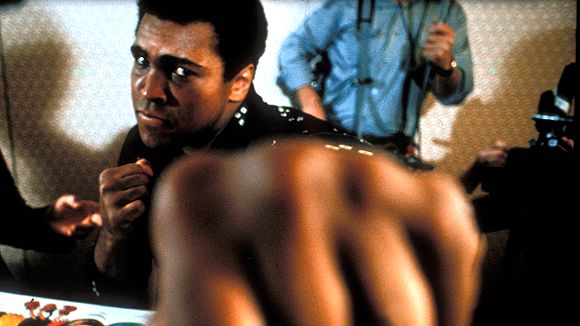Why are we still fascinated by Muhammad Ali?
Few athletes in the history of modern sport can claim to have been, at the apex of their celebrity, known to the masses not just in their native land, but worldwide. Fewer still can boast of enjoying a similar standing almost 30 years after the last time they performed, and almost 40 years from that time when the world was at their feet.
Muhammad Ali is such an athlete.
It seems incomprehensible today that a mere boxer could command such worldwide fame that, a quarter-century after his final appearance in a prize ring, his image remains one of the most recognizable on the planet. Ali's does. Still.
In 2006, 25 years after an ordinary heavyweight named Trevor Berbick pummeled him into a final, dreadful retirement in the Bahamas, CKX, an entertainment licensing firm, paid Ali $50 million in cash for an 80 percent stake in his name and likeness.
WEREK/Imago/Icon SMI
Lethal with his fists and sharp with his tongue, Muhammad Ali carved his place into the public's mind.
In 1999, Sports Illustrated named Ali the "Athlete of the Century." So did the BBC and GQ magazine. In 1996 he lit the torch at the Atlanta Olympics, his body quaking from the debilitating physical effects of Parkinson's syndrome, from which he has suffered since the early 1980s, and which eventually stole away perhaps the most instantly recognizable voice of the modern sporting era.
He has not managed to successfully put together a clear and easily intelligible speech in front of the major press in years, but in 2005 he was awarded the Presidential Medal of Freedom Award. In 2007, Ali received an honorary doctorate of humanities at Princeton University's 260th graduation ceremony. In 2001, Will Smith played the title role in the feature film, "Ali."
Clearly Ali retains a singularly strong hold, not only on the American sporting culture, but on the popular culture at large in much of the industrialized world, even after such a period of time has passed that reduces other mythic sports heroes to relics recalled only when dark milestones are reached.
The question that begs asking: Why? Why do we remain so captivated by Ali?
To some, the answer is simple.
"Because, when he was younger, he was the most charismatic and famous person of his time," said ESPN.com contributor Thomas Hauser, the author of "Muhammad Ali: His Life and Times," an oral history considered by most the definitive Ali biography.

Icon SMI
In his prime, Ali knew what to say and what to do at exactly the right times.
It is saying quite a lot, considering Ali's prime coincided with the primes of some of the 20th century's most influential figures in politics, music, art and literature. One could make the argument that the times made Ali as much as he made them, that the fiery defiance he brought to race relations, religion and politics wouldn't have been possible at an earlier time and would have appeared unseemly, contrived, or inappropriate later.
Indeed, in his extraordinary book, "Ghosts of Manila," the late Mark Kram Sr. argued, at times persuasively, that Ali was not only just an athlete, as opposed to an important socio-political figure, but one of questionable intelligence and conviction.
"Current hagiographers have tied themselves in knots trying to elevate Ali into a heroic, defiant catalyst of the anti-war movement, a beacon of black independence," wrote Kram. "It's a legacy that evolves from the intellectually loose sixties, from those who were in school then and now write romance history."
In another passage, Kram expounded. "Seldom has a public figure of such superficial depth been more wrongly perceived -- by the right and the left." And later on, "[Ali was] no more a social force than Frank Sinatra. The politically fashionable clung to his racial invective as if it were the wisdom of a seer. Today, such are the times, he would be looked upon as a contaminant, a chronic user of hate language and a sexual profligate."
If Kram was right, then it is all the more remarkable that Ali's cultural presence is what it is today, that his supporters have so successfully and for so long managed to convince the rest of us of his social and cultural merit. If it was their job to create a legend, and to make that legend last, they have performed superbly. Kids who weren't born yet when Ali lost to Larry Holmes in 1980 know who he is and what he did, even if they don't know the details.
"There are a handful of iconic figures who transcend their field so even if people didn't know them and weren't around when they were, the stories and the folklore are such that they span generations," said Showtime's Al Bernstein, who covered Ali's pitiable, 10-round KO loss to Holmes in Las Vegas.
"Everyone over 45 years of age or so would talk about him, talk about having seen him fight or hearing him, and so everyone under 30 has heard about him," Bernstein said. "He endures."
There is considerable support for the idea that Ali's illness, the Parkinson's, the very demon that has silenced him, has simultaneously abetted his remarkable cultural stamina, has helped his legend endure.
.
.
.
.
continued
Entire article:
ESPN - Why are we still fascinated by Muhammad Ali? - Boxing







